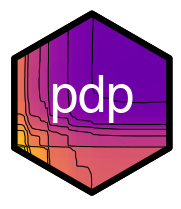
The hardware and bandwidth for this mirror is donated by dogado GmbH, the Webhosting and Full Service-Cloud Provider. Check out our Wordpress Tutorial.
If you wish to report a bug, or if you are interested in having us mirror your free-software or open-source project, please feel free to contact us at mirror[@]dogado.de.

pdp is an R package for constructing partial dependence plots (PDPs) and individual conditional expectation (ICE) curves. PDPs and ICE curves are part of a larger framework referred to as interpretable machine learning (IML), which also includes (but not limited to) variable importance plots (VIPs). While VIPs (available in the R package vip) help visualize feature impact (either locally or globally), PDPs and ICE curves help visualize feature effects. An in-progress, but comprehensive, overview of IML can be found at the following URL: https://github.com/christophM/interpretable-ml-book.
A detailed introduction to pdp has been published in The R Journal: “pdp: An R Package for Constructing Partial Dependence Plots”, https://journal.r-project.org/articles/RJ-2017-016/index.html. You can track development at https://github.com/bgreenwell/pdp. To report bugs or issues, contact the main author directly or submit them to https://github.com/bgreenwell/pdp/issues. For additional documentation and examples, visit the package website.
As of right now, pdp exports the following
functions:
partial() - compute partial dependence functions and
individual conditional expectations (i.e., objects of class
"partial" and "ice", respectively) from
various fitted model objects;
plotPartial()" - construct
lattice-based PDPs and ICE curves;
autoplot() - construct ggplot2-based
PDPs and ICE curves;
topPredictors() extract most “important”
predictors from various types of fitted models.
exemplar() - construct an exemplar record from a
data frame (experimental feature that may be useful for
constructing fast, approximate feature effect plots.)
# The easiest way to get pdp is to install it from CRAN:
install.packages("pdp")
# Alternatively, you can install the development version from GitHub:
if (!("remotes" %in% installed.packages()[, "Package"])) {
install.packages("remotes")
}
remotes::install_github("bgreenwell/pdp")These binaries (installable software) and packages are in development.
They may not be fully stable and should be used with caution. We make no claims about them.
Health stats visible at Monitor.